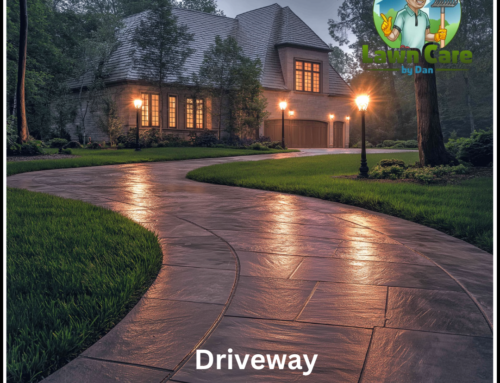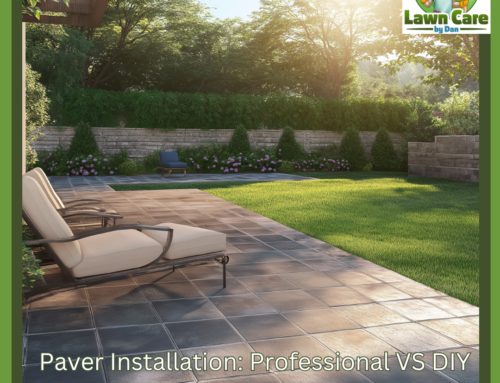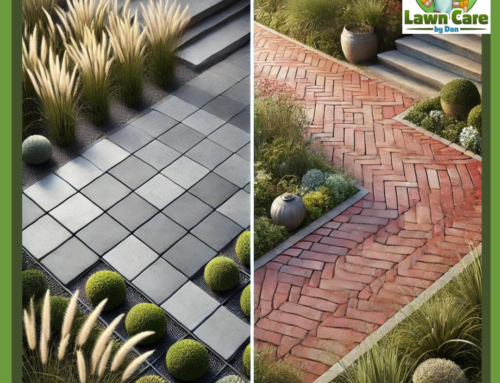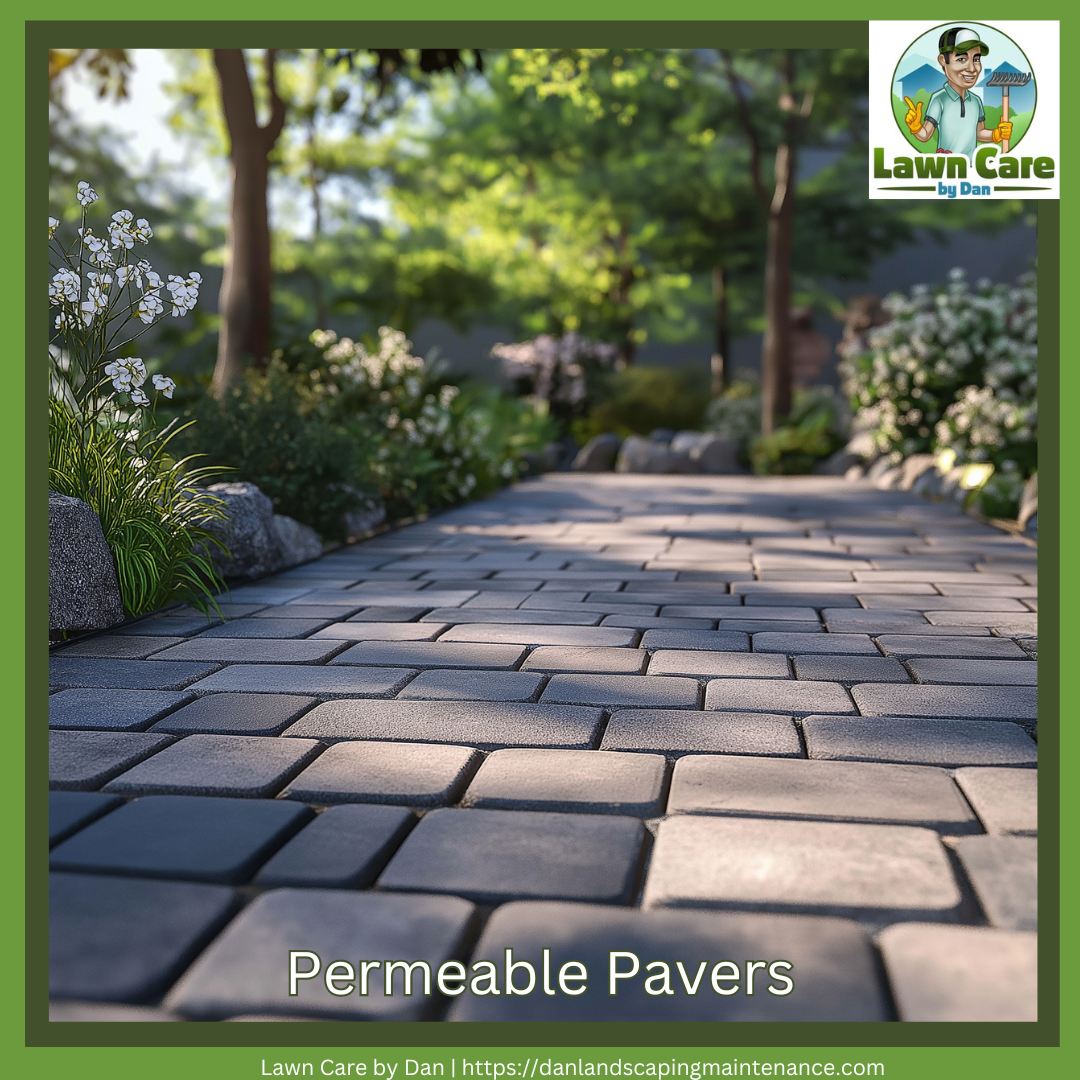
Imagine stepping out into your yard and feeling like you’re part of nature, not just surrounded by it. That’s the magic of eco-friendly landscaping. One of the most innovative ways to make your landscape both beautiful and sustainable is by using permeable pavers for your walkways.
In this article, Lawn Care By Dan Paver Patios will guide you through everything you need to know about permeable pavers, from how they work to why they’re an excellent choice for your next landscaping project.
What Are Permeable Pavers?
Permeable pavers are specially designed paving materials that allow water to pass through them, reducing runoff and helping to replenish groundwater. Unlike traditional concrete or asphalt, which can create barriers that force water to flow into storm drains, permeable pavers let water soak naturally into the ground.
The Unexpected Origin of Permeable Pavers
Did you know that the concept of permeable paving has roots in ancient times? The Romans used gravel-filled roads to control water drainage, laying the groundwork for the modern permeable paver. It’s a time-tested idea with a new, eco-friendly twist!
The Eco-Friendly Edge of Permeable Pavers
Permeable pavers are more than just a trend; they’re vital to sustainable landscaping. As water scarcity and environmental concerns grow, homeowners increasingly seek ways to make their properties more eco-conscious. Lawn Care By Dan Paver Patios has found that using permeable pavers is one of the simplest yet most effective methods to achieve this goal.
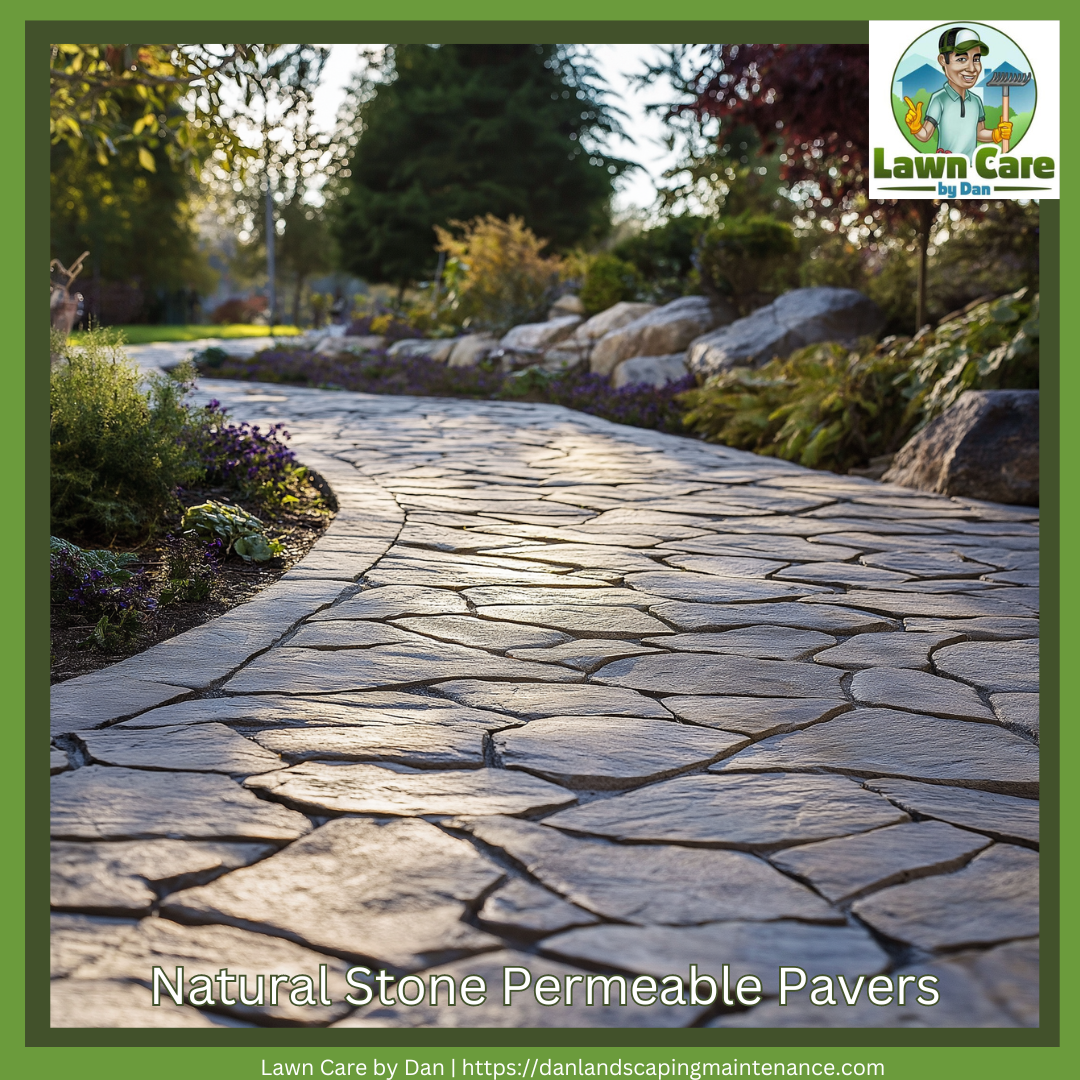
Environmental Benefits:
- Reduced Stormwater Runoff: Permeable pavers mitigate stormwater runoff, decreasing the load on municipal systems and reducing the risk of flooding.
- Improved Water Quality: As water filters through the pavers, it’s naturally cleansed of pollutants before re-entering the ecosystem.
- Enhanced Groundwater Recharge: These pavers help replenish groundwater levels, which is essential for maintaining the water table and supporting local vegetation.
How Permeable Pavers Work
The science behind permeable pavers is surprisingly simple yet incredibly effective. Each paver is designed with small gaps or porous materials that allow water to seep through and be absorbed by the ground below.
Key Components:
- Base Layer: A crushed stone or gravel layer provides structural support and facilitates water drainage.
- Pavers: Pavers are made from porous materials or designed with joints that allow water to pass through.
- Subsurface: Beneath the base layer, the subsurface collects and channels the water back into the soil, preventing erosion and runoff.
Top Benefits of Using Permeable Pavers
Permeable pavers are a game-changer in sustainable landscaping, offering an array of benefits that go beyond aesthetics. Lawn Care By Dan Paver Patios highlights the most compelling reasons to consider these innovative pavers for your walkways and driveways.
1. Environmental Impact: Reducing Runoff and Protecting Waterways
One of the most significant advantages of permeable pavers is their ability to reduce stormwater runoff. Traditional surfaces like concrete and asphalt prevent water from seeping into the ground, leading to increased runoff that can carry pollutants into local waterways. Permeable pavers allow rainwater to infiltrate the soil, helping to filter out contaminants before they reach streams, rivers, and lakes. This natural filtration process protects aquatic ecosystems and contributes to cleaner drinking water sources.
2. Aesthetic Versatility: Customizing Your Landscape
Permeable pavers come in various shapes, colors, and textures, allowing endless design possibilities. Whether you prefer a rustic cobblestone look, sleek modern lines, or something in between, you can find pavers that complement your home’s style. Lawn Care By Dan Paver Patios has helped many homeowners create custom walkways that enhance their property’s curb appeal while maintaining functionality. Mixing and matching paver styles means you can create unique patterns and designs that make your landscape truly one-of-a-kind.
3. Long-Term Durability: Built to Last
Permeable pavers are designed to withstand the test of time, making them a durable option for high-traffic areas like driveways and walkways. Unlike asphalt, which can crack and degrade over time, permeable pavers are more resistant to freeze-thaw cycles and heavy loads. The flexibility of the pavers allows them to move slightly with the ground, reducing the risk of cracks and maintaining a smooth surface. This durability means you won’t need to worry about frequent repairs or replacements, making them a cost-effective choice in the long run.
4. Cost Efficiency: Savings Over Time
While the initial installation cost of permeable pavers might be higher than traditional options, they can save you money in the long run. Their durability reduces the need for repairs and replacements, and their ability to manage stormwater can potentially lower your water bills and reduce the need for expensive drainage systems. Moreover, some municipalities offer incentives or rebates for installing permeable surfaces, recognizing their environmental benefits.
5. Temperature Regulation: Cooler Surfaces in Hot Weather
One of the lesser-known benefits of permeable pavers is their ability to reduce heat buildup, a phenomenon known as the urban heat island effect. Traditional paving materials like asphalt absorb and retain heat, making them uncomfortable to walk on and contributing to higher temperatures in urban areas. Permeable pavers allow air and water to circulate through them, keeping the surface cooler. This makes your outdoor spaces more comfortable during hot weather and contributes to a cooler overall environment around your home.
6. Enhanced Safety: Reducing Slips and Falls
Safety is crucial for any outdoor space, and permeable pavers excel in this area. By allowing water to seep through the surface, these pavers reduce the likelihood of puddles forming, which can lead to slippery conditions. This is especially important here in Vancouver, which is prone to rain or ice, where traditional surfaces might become hazardous. Lawn Care By Dan Paver Patios recommends permeable pavers for walkways and driveways where safety is a top priority, particularly for families with children or elderly residents.
7. Supporting Local Ecosystems: Promoting Biodiversity
Permeable pavers do more than just manage water—they also support local ecosystems by allowing natural water infiltration. This process helps maintain healthy soil conditions and promotes the growth of native plants, which in turn supports local wildlife. Birds, insects, and other creatures benefit from a more natural habitat, contributing to greater biodiversity in your area. By choosing permeable pavers, you’re not just enhancing your property but also playing a role in preserving the natural environment.
8. Low Maintenance: Easy Care for Long-Lasting Beauty
Maintaining permeable pavers is generally straightforward, requiring less effort than traditional paving options. Routine tasks include occasional sweeping to remove debris and periodic joint cleaning to ensure optimal water flow. Unlike concrete, which may need sealing and crack repairs, or asphalt, which can require resurfacing, permeable pavers look great with minimal intervention. Lawn Care By Dan Paver Patios suggests inspecting your pavers annually to address any potential issues early, ensuring they remain in top condition for years.
9. Versatile Applications: From Patios to Driveways
Permeable pavers aren’t just limited to walkways—they can be used in a variety of applications across your property. Whether you’re looking to create a stylish patio, a functional driveway, or a garden path, these pavers offer the flexibility to meet your needs. Their ability to handle different traffic loads, from pedestrian to vehicular, makes them versatile for any outdoor project. Lawn Care By Dan Paver Patios can help you explore creative ways to incorporate permeable pavers into your landscape design, maximizing functionality and aesthetic appeal.
Choosing the Right Permeable Pavers
Selecting the perfect permeable pavers for your project involves more than just picking a style you like. It requires careful consideration of your environment, the specific use case, and long-term maintenance needs. Lawn Care By Dan Paver Patios recommends focusing on several key factors to ensure you choose the pavers that best suit your landscape.
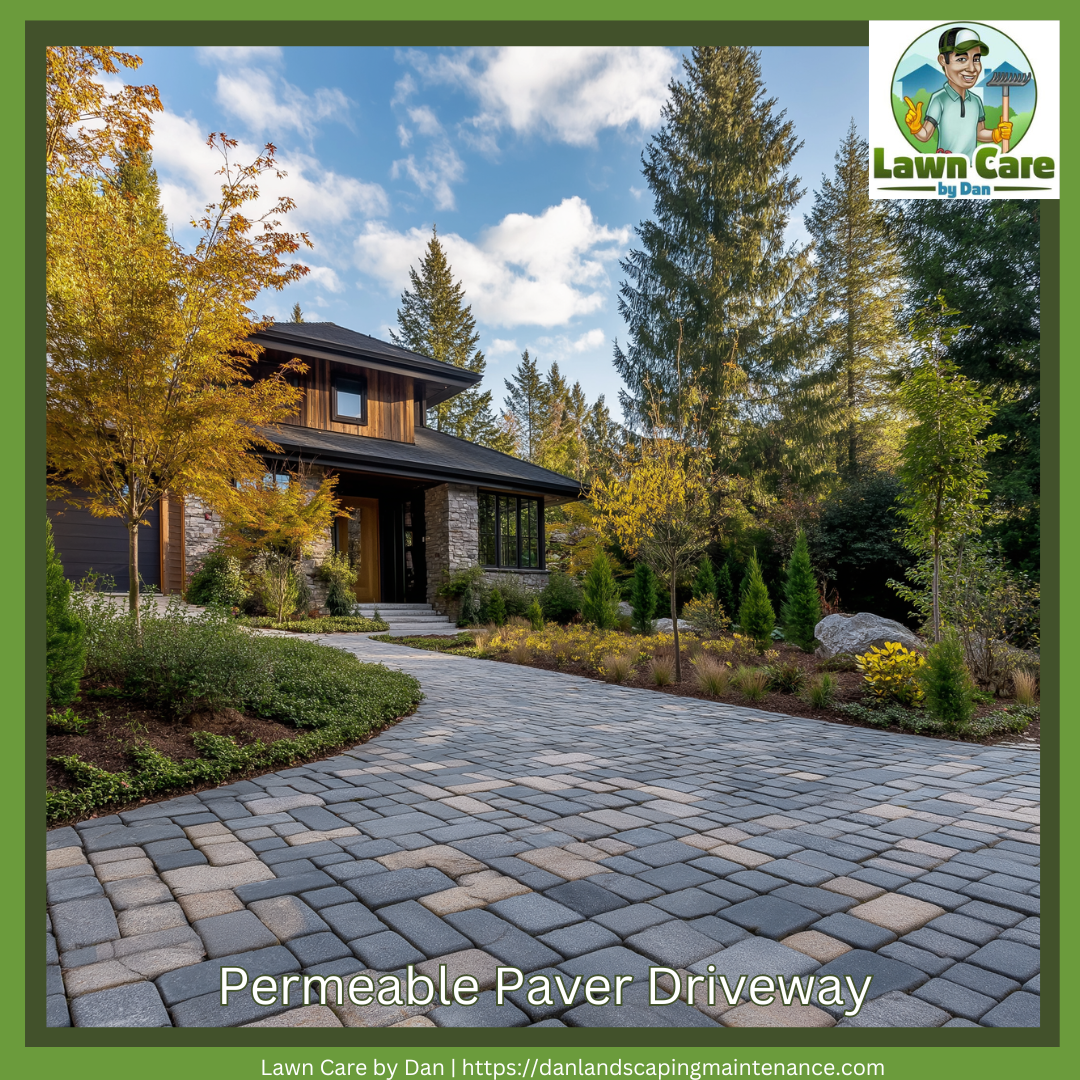
1. Material Selection: Understanding Your Options
Permeable pavers come in various materials, each offering different benefits and aesthetics. Understanding these options will help you make an informed decision.
- Concrete Pavers:
Concrete pavers are among the most popular due to their durability and versatility. They are available in various colors, shapes, and sizes, allowing endless design possibilities. Additionally, they’re often the most cost-effective option, making them ideal for larger projects like driveways or extensive walkways. - Brick Pavers:
Brick pavers offer a classic, timeless look that suits traditional and colonial-style homes. They are made from natural clay and fired in a kiln, making them durable and environmentally friendly. Brick pavers tend to age well, developing a patina over time that adds character to your landscape. However, they may be slightly more expensive than concrete options. - Natural Stone Pavers:
If you’re looking for a premium, natural look, stone pavers are an excellent choice. Materials like granite, limestone, and bluestone offer unmatched beauty and durability. Natural stone pavers are often used in high-end landscapes and can add significant value to your property. However, they require careful installation and may be more costly, both in material and labor. - Gravel Pavers:
Gravel-filled pavers combine the rustic appeal of gravel with the stability of a paver grid system. They’re highly permeable and ideal for areas where you want a more natural, organic look. Gravel pavers are often used in driveways and garden paths. While cost-effective and easy to install, they may require more maintenance to distribute the gravel evenly evenly.
2. Permeability Rating: Matching Your Environment
The primary function of permeable pavers is to allow water to pass through, so understanding the permeability rating of different paver types is crucial.
- Rainfall and Climate:
Consider the average rainfall in your area when selecting your pavers. In regions with heavy rain, like Vancouver, WA, pavers with higher permeability are preferred to handle large volumes of water. In drier climates, moderate permeability pavers may suffice while offering environmental benefits. - Soil Type:
The soil beneath your pavers significantly affects how well the system will work. Sandy soils typically drain well and can handle high-permeability pavers. In contrast, clay-heavy soils might require additional layers of gravel beneath the pavers to improve drainage. Lawn Care By Dan Paver Patios can perform a soil analysis to recommend the best paver and drainage system for your specific site. - Land Use:
Consider how the area will be used. For example, a driveway that supports vehicles may need pavers with a different permeability rating than a pedestrian walkway. Pavers with higher load-bearing capacity and moderate permeability are ideal for driveways, while walkways can utilize pavers with higher permeability and less load-bearing capability.
3. Design and Aesthetic Considerations
The visual appeal of your permeable pavers is just as important as their functionality. Here are some design tips to ensure your pavers enhance your landscape’s aesthetic:
- Color Coordination:
Choose pavers that complement your home’s exterior and the surrounding landscape. Earth tones, such as browns, tans, and grays, are versatile and blend seamlessly with most environments. For a bolder statement, consider pavers in contrasting colors that make your walkway or driveway a focal point. - Shape and Pattern:
The shape and pattern of your pavers can significantly influence the overall look of your landscape. Rectangular pavers can be laid in traditional herringbone or running bond patterns, while square or hexagonal pavers allow for more contemporary designs. Consider mixing different shapes or sizes to create a unique pattern that reflects your personal style. - Edge Restraints:
Edge restraints are essential to maintaining the integrity of your paver installation. They prevent the pavers from shifting over time and help maintain the overall design. Choose edge restraints that are both functional and aesthetically pleasing, such as metal or stone borders that complement your paver choice.
4. Durability and Maintenance Requirements
While permeable pavers are generally low-maintenance, different materials and designs have varying upkeep needs. Consider the following:
- Cleaning and Sealing:
Depending on the material, you may need to clean and seal your pavers periodically to maintain their appearance and functionality. Sealing benefits concrete and brick pavers, protecting them from staining and wear. Natural stone may also require sealing, especially in high-traffic areas. - Weed and Moss Control:
Joints between pavers can sometimes become breeding grounds for weeds and moss, particularly in shaded or damp areas. Polymeric sand in the joints can help minimize this issue, as it hardens when wet and prevents weeds from taking root. Regular sweeping and occasional application of a mild herbicide can also keep your pavers looking clean. - Winter Care:
In colder climates, it’s essential to consider how your pavers will handle freeze-thaw cycles. Concrete and brick pavers are typically frost-resistant, but de-icing salts can cause damage over time. Opt for pavers rated for winter conditions, and consider using sand instead of salt to melt ice and snow. Lawn Care By Dan Paver Patios can guide winterizing your paver installations.
5. Cost Considerations: Balancing Budget and Quality
Your budget is key in choosing the right permeable pavers, but it’s important to balance cost with quality and long-term benefits.
- Initial Investment:
While some paver materials may have a higher upfront cost, they can offer greater durability and lower maintenance expenses over time. For example, natural stone pavers are more expensive than concrete, but they provide a luxurious, long-lasting finish that can increase property value. - Installation Costs:
The complexity of the installation process also affects the overall cost. Some materials, like natural stone, require more labor-intensive installation, which can increase the price. More straightforward installations with concrete or gravel pavers may be more budget-friendly. Lawn Care By Dan Paver Patios can help you assess installation costs and find the best solution for your budget. - Long-Term Savings:
Consider the long-term savings associated with permeable pavers, such as reduced stormwater management costs and lower maintenance expenses. Additionally, some local governments offer incentives for installing eco-friendly landscaping solutions, which can help offset the initial investment. Lawn Care By Dan Paver Patios can assist you in exploring these opportunities.
6. Compatibility with Existing Landscape
Finally, it’s essential to ensure that your permeable pavers are compatible with your existing landscape and future plans.
- Blending with Existing Features:
If you already have established landscaping, such as gardens, trees, or water features, choose pavers that blend seamlessly with these elements. This creates a harmonious overall look and prevents the pavers from clashing with your existing design. - Future Landscaping Projects:
Consider how your paver choice will fit into any future landscaping plans. If you’re planning to add new features, such as a patio, driveway, or garden path, choose pavers that can be easily integrated into these projects. - Environmental Impact:
Think about the broader environmental impact of your paver choice. Permeable pavers contribute to a more sustainable landscape by reducing runoff and supporting groundwater recharge. Lawn Care By Dan Paver Patios encourages considering how your paver choice aligns with your overall environmental goals.
By carefully considering these factors, you can select the permeable pavers that best suit your needs, ensuring a beautiful, functional, and sustainable landscape. Lawn Care By Dan Paver Patios is here to guide you through the selection process, helping you choose the perfect pavers that will enhance your property for years to come.
Summary
Permeable pavers offer a brilliant blend of functionality, sustainability, and beauty, making them an ideal choice for eco-friendly landscaping. By choosing permeable pavers for your walkways, you’re enhancing your home’s aesthetics and contributing positively to the environment.
Lawn Care By Dan Paver Patios is committed to helping you make informed decisions that benefit your property and the planet. With our expertise, you can transform your landscape into a haven of sustainability and style.
FAQs About Permeable Pavers
Q1: Are permeable pavers expensive?
A: While they may cost more upfront, the long-term maintenance and stormwater management savings often outweigh the initial investment.
Q2: Do permeable pavers require special maintenance?
A: Generally, permeable pavers are low-maintenance. Occasional cleaning of the joints and ensuring proper drainage are typically needed.
Q3: Can permeable pavers handle heavy traffic?
A: Yes, permeable pavers are designed to be strong and durable, making them suitable for driveways, patios, and high-traffic walkways.
Q4: Will weeds grow between the pavers?
A: Using the correct joint filler can minimize weed growth, though some minimal maintenance may be required.
Q5: How long do permeable pavers last?
A: With proper installation and care, permeable pavers can last 20-30 years or more.


